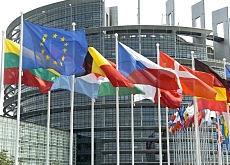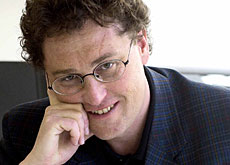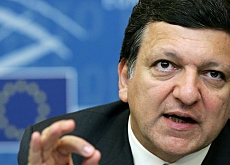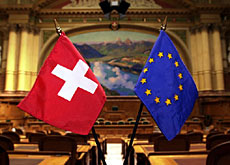EU disappointed by Swiss report on Europe

The European Parliament in the French city of Strasbourg has expressed disappointment over the Swiss government's latest report on European policy.
Diana Wallis, who is president of the parliament’s delegation for relations with Switzerland, said the “Europe 2006” report published on Wednesday last week in Bern did not look into the future.
The document said that Switzerland would continue its policy of consolidating bilateral ties with the EU, while the country’s 14-year-old membership application would remain on hold.
Switzerland has signed two sets of bilateral treaties with Brussels.
“The report, as one would expect, sets out a thorough analysis of the historical and current situation between the EU and Switzerland but declines to point a way forward,” Wallis said on Thursday.
“Even as a discussion document it may be misleading, as many of the options examined between the bilaterals and full membership are at best unlikely and probably are not on offer at all from the EU side.”
Illusory
The idea of an enlargement of the European Economic Area was probably illusory as any country wanting to join it also had to be willing to join the EU since the economic criteria would be identical, she commented.
“The only difference is that EEA members that are not simultaneously EU members are left with little influence on the EU’s decision-making process.
Wallis noted that Switzerland arguably already had a better deal through the bilaterals than EEA countries such as Norway and Iceland.
“So it all looks rather like carry on as you are. Despite this, I do hope the report will generate some new discussion and debate in Switzerland.”
But she congratulated the Swiss authorities on “such an extensive and detailed” document.
Wallis added that she would be interested to hear what her parliamentary colleagues from Switzerland had to say next week in Brussels at the 25th EU-Switzerland interparliamentary meeting.
Warning
In other news relating to the EU and Switzerland, the EU Commission’s president, José Manuel Barroso issued a warning to Switzerland about its planned SFr1 billion ($814 million) contribution to the ten new EU members.
He told Swiss radio on Thursday that if a referendum were to turn down Switzerland’s contribution to the so-called Cohesion Fund it would send a wrong signal to the new members.
Barroso’s comments come just a day after he sharply criticised the tax breaks awarded to companies by some Swiss cantons.
Speaking on Swiss television a few days before meeting Swiss President Moritz Leuenberger, Barroso described the breaks as “clearly discriminatory”.
Free movement
And in another development a joint committee said on Thursday that the application of the free movement of people accord between Brussels and Bern had been positive for the fourth successive year.
The agreement, which came into force on June 1, 2002, was extended to the ten new EU member states from April in a protocol, a statement from the Federal Migration Office said.
However, after a meeting in Brussels, the committee noted that there were growing differences between the accord and the “dynamic” regulations prevailing within the EU.
It also set up a working group to look into how diplomas could be more quickly recognised because Switzerland was taking more time in accepting them than was the case in EU member states.
swissinfo with agencies
1972: Switzerland and the European Community sign a free trade agreement.
1992: Bern lodges an application for membership of the European Union. In the same year, the people reject membership of the European Economic Area.
2002: the first package of bilateral agreements with the European Union comes into force.
2004: Bern and Brussels sign a second package of measures.
Relations with the EU are defined by two packages of bilateral treaties.
To improve the working of these agreements, which cover several areas, the possibility of a “framework agreement” has been mooted.
The government has just published a report in which it said that Switzerland would continue its policy of consolidating bilateral ties with the EU.

In compliance with the JTI standards
More: SWI swissinfo.ch certified by the Journalism Trust Initiative



You can find an overview of ongoing debates with our journalists here. Please join us!
If you want to start a conversation about a topic raised in this article or want to report factual errors, email us at english@swissinfo.ch.